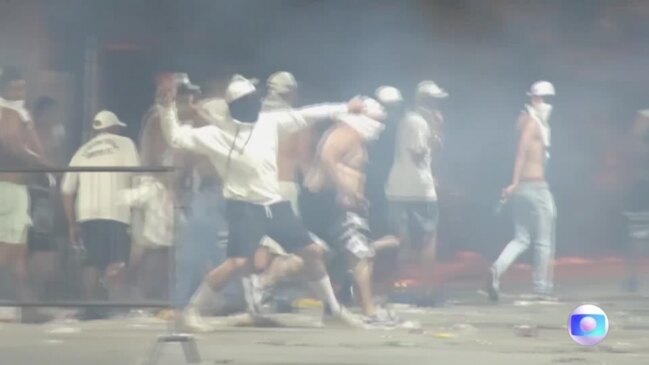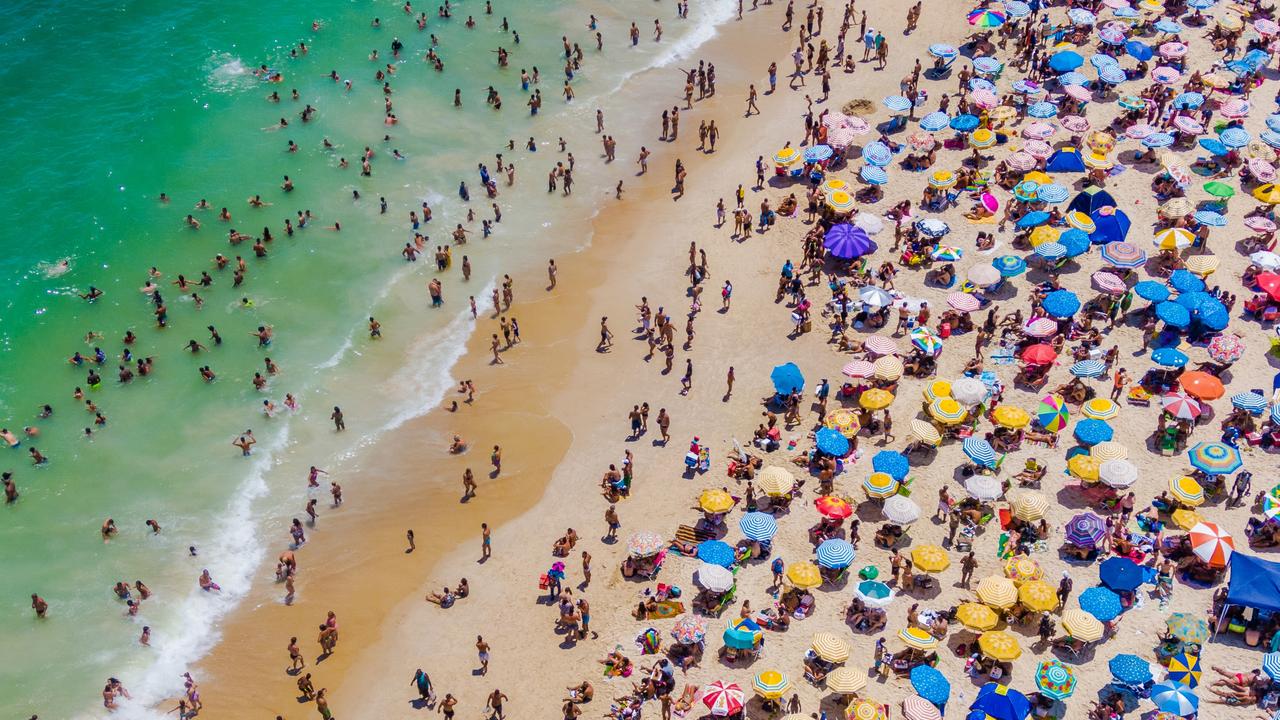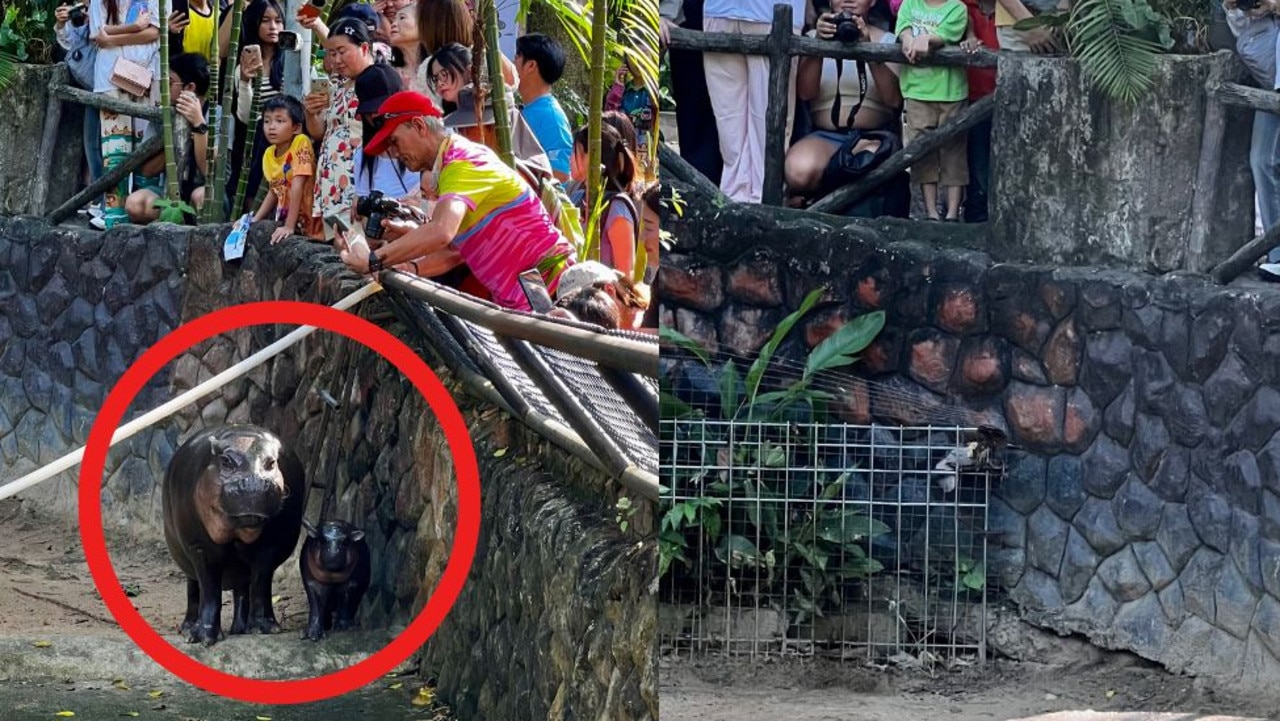Brazil’s idyllic Copacabana rocked by crime, vigilantes
The idyllic beach is a tourist hotspot but now locals are roaming the iconic destination in packs to keep a massive crime spree at bay.

Famed for its turquoise waters, lush beaches and breathtaking views, iconic Brazilian tourism destination Copacabana is reeling from violent crime, leading residents to launch vigilante groups — worrying authorities and rights activists.
The upscale Rio de Janeiro neighbourhood has been making headlines for the wrong reasons in recent weeks: a tourist in town for a Taylor Swift concert stabbed to death on the beach; a man punched unconscious in a brutal mugging; a young woman raped by a homeless man.
The social media-fuelled reaction has generated yet more headlines, as locals have organised vigilante groups and taken to the streets with bats, brass knuckles and other weapons to stalk alleged criminals.
Viral videos show large groups of young men dressed in black, their faces covered, patrolling the neighbourhood and violently beating those they accuse of committing crimes.
In deeply unequal Brazil, the vigilantes face accusations of racism in pursuing their “suspects.”
“It’s clear who’s a ‘criminal’ to these vigilantes: poor black men,” musician and black-rights activist Tas MC wrote on X, formerly Twitter.

Fault lines
The situation has exposed the fault lines of a Brazil still divided by last year’s elections between far-right ex-president Jair Bolsonaro and Luiz Inacio Lula da Silva, the leftist who narrowly defeated him — and who faces accusations from conservatives of being soft on crime.
Rio is no stranger to violent crime, or violent reactions to it. Five years ago, then-president Michel Temer deployed the army to take over security in the city for 10 months, saying organised crime had become a “cancer” in Rio.
The 2016 Olympics host city is a frequent scene of bloody battles between heavily armed drug gangs and police, typically in poor “favela” neighbourhoods.
And it has struggled for decades with militias that initially formed as neighbourhood anti-crime committees, then evolved into organised criminal groups themselves.
But Copacabana’s latest spike in violence is affecting the identity of a neighbourhood known for its laid-back, carefree vibe, where residents are used to strolling the streets in swimsuits and flip-flops.
“Copacabana is sad,” said 42-year-old businessman Thiago Nogueira, sporting a tank top stamped “Rio de Janeiro.” “The violence is really bad — and it’s getting worse,” he told AFP. Local businesses are also worried over the impact on tourism. The president of hotel association HoteisRio urged tougher punishments for criminals to stop repeat offenders.

‘The system has collapsed’
Robberies in Copacabana are up 25 per cent this year from the same period last year, and theft from pedestrians up 56 per cent, according to news site G1, citing figures from Brazil’s Public Security Institute.
Authorities have announced the deployment of 1,000 police and a “security cordon” on nights and weekends.
After holding a crisis meeting Thursday, Rio security officials announced they would increase the visibility of patrols and the number of police stops to counter the violence.
They also urged residents to leave policing to the police.
“Vigilantes commit crimes saying they’re preventing other crimes. In reality, they’re criminals, too,” said Victor Santos, the Rio state security secretary — a post recreated last month by right-wing Governor Claudio Castro to tackle rising crime.
Residents’ exasperation is fuelled by a sense the justice system is broken. According to Brazilian media reports, two of the suspected robbers accused of killing the 25-year-old Taylor Swift fan on November 19 had been arrested the day before for stealing chocolate from a department store.
They were granted conditional release at their custody hearing. In all, the three suspects arrested in the case had previously been stopped by police 108 times.
The mugger who knocked a man unconscious on the sidewalk on December 2 was meanwhile “well-known to the authorities, with nine entries on his criminal record,” the lead investigator on the case told a news conference Thursday.
“The system has collapsed,” journalist Octavio Guedes wrote in a column for G1. “When the message that ‘the police arrest them, the courts free them’ gets lodged in people’s heads, it gives rise to another kind of barbarity: vigilante groups.”



